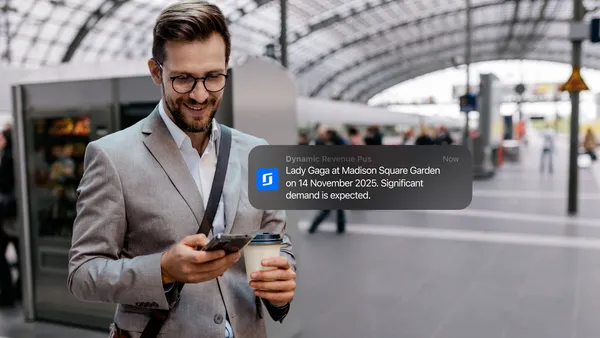Dive Brief:
- There is an urgent need for travel and tourism businesses to embrace artificial intelligence as a strategic priority, according to the World Travel & Tourism Council, which released two reports about the impact of AI on the travel industry in tandem with the United Nations General Assembly last week.
- The reports — which follow up on AI research WTTC released in January — discuss potential risks of the technology’s deployment in the travel industry, as well as provide a detailed overview of the AI ecosystem across countries and international organizations.
- AI is more than a technological advancement — it’s a tool that can personalize the customer experience, further sustainability goals and advance the future of travel, Julia Simpson, the council’s president and CEO, said. “But this progress is not without its dangers,” she wrote in the first report.
Dive Insight:
AI is already being used across the travel and tourism sector “with incredible results,” Simpson said in a statement.
“Several major hotel groups including Iberostar are using AI to monitor and reduce food waste, which recently resulted not only in a 27% cost saving but prevented thousands of kilos of unwanted food going to landfill,” she added.
WTTC’s two latest reports are meant to “underscore a commitment to a digital future that prioritizes safety, ethical considerations and responsible AI adoption,” the organization wrote in a release obtained by Hotel Dive.
“Responsible Artificial Intelligence” discusses the risks associated with the technology: bias, job replacement, disinformation, safety and security and existential risk. It then presents responsible AI frameworks created by government organizations and major tech developers.
WTTC suggests travel businesses that don’t yet have an approach to responsible and ethical AI usage can look to the frameworks created by the National Institute of Standards and Technology, Microsoft, IBM and Google as a good starting point.
The second report, "Artificial Intelligence: Global Strategies, Policies & Regulations," dives into country-specific AI regulations with travel operators in mind.
The U.S., it notes, does not currently have a national-level framework for AI regulation, but WTTC has pledged to “continue to monitor key developments in the regulation of AI, particularly as leading nations and intergovernmental bodies such as the UN, EU, China and the U.S. develop their approaches.”
“We are excited to see what the future holds as AI becomes more widely adopted,” Julie Shainock, managing director of travel, transport and logistics industry for Microsoft, said in a statement about the two reports. “We are seeing AI being embraced across the entire travel eco-system enhancing the customer experience, the employee experience and also driving more efficiency in operations, but we know we are only at the beginning of the journey.”
Despite the travel sector’s increasing recognition of AI's potential, WTTC said, challenges persist, particularly AI-skilled workforce shortages.
Hotel companies, in particular, are already employing AI to further personalize the search and booking experience. Earlier this month, IHG Hotels & Resorts tapped Google Cloud to create an AI-powered travel planner, and Marriott International’s Bonvoy loyalty program began testing an AI-based search function.
Deloitte also predicted that generative AI travel agents will grow in popularity in coming years.
The potential applications of AI in hotels go well beyond booking, according to Minwoo Lee, associate professor and director of hospitality analytics and innovation at the University of Houston. He previously told Hotel Dive that the technology can be applied in areas as diverse as strategic management, hotel operations, hotel marketing and human resources and talent management.










